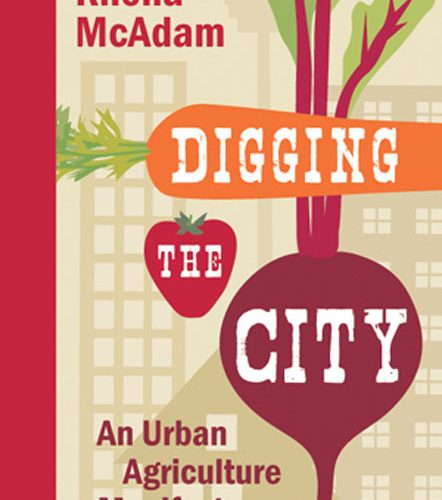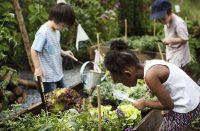Rhona McAdam has eaten her way through Europe and has worked as a cook and a food writer. She keeps her own garden and is an active member of the food-security community.
Rhona McAdam has eaten her way through Europe and has worked as a cook and a food writer. She keeps her own garden and is an active member of the food-security community. In Digging the City, she takes her readers on a food-production journey through time and space and lands us here in Canada, where she says we are at risk because “it’s not only possible but acceptable for families to buy 100 per cent of their food from supermarkets for their entire lives.” Without access to local and/or sustainable agriculture, we are losing our connection to flavourful and nutritious food, putting our health in peril.
Geared toward readers who already have some notion of food production, security, and trade, but may not yet be devoted locavores, Digging the City offers motivation to consider exactly what is in all those packages lining your refrigerator shelves and question why you made the food choices that you did.
Building on a local food ethic recently popularized by Alisa Smith and J.B. McKinnon’s 100-Mile Diet, McAdams suggests that the future of food-secure cities – and of food production in general – lies in diversification and localization. She considers both flora and fauna, and how we have come to be so far removed from the processes of the large-scale systems that provide our food. She explores how little awareness we have of the treatment endured by the animals we consume.
In addition to the treatment of our food, we are largely unaware of how we take our food systems for granted, demanding diverse and exotic foods throughout the year. On the other hand, we require food to be processed and simplified for our consumption – “convenience foods” and nothing more. Many of us may be content with these food choices, but our true well-being depends upon alternatives and increased awareness of our food choices and vulnerabilities. Through urban initiatives, McAdams asserts, “we can take charge of our own food supply and choose to understand how our food is produced, where it comes from, and how to make the best use of it.”
McAdams makes it clear there is no panacea for the transition to local and diverse food. She puts the onus on individuals living in urban settings to change the food culture of the urban landscape. Bringing food production home – on whatever scale possible – is an important aspect of our collective well-being and sustainability. From the smallest container garden on a condo balcony, to the largest urban community gardens, this move toward a new culture of food is essential to ensure that our food remains healthy, safe, and readily available. Such a move takes more than action, it requires a shift of consciousness. Local food might be less exciting than the mango from Mexico, the garlic from China, or the factory-farmed beef available at an affordable price, but it is necessary.
We may not all become beekeepers or chicken farmers, and most of us won’t set up farm stands in our front yards. But we can all choose to acknowledge the decisions we make when supporting big box stores and agricultural conglomerates in our quest for the cheapest food. We can reverse these choices by participating in local food systems. There are already changes happening: farmers’ markets are busy, community garden plots often have waiting lists, and seed-starting kits encourage us to engage with our food directly. The situation is not hopeless and the move away from local food is not inevitable – far from it. Making conscious and informed decisions about our agricultural decisions will require rooting in the earth and considering alternative ways of being with our food. It may be a struggle, but as McAdams writes, “If food isn’t worth making noise about, what is?”
Digging the City: An Urban Agriculture Manifesto, Rhona McAdam, Vancouver, BC: Rocky Mountain Books, 2012, 168 pages
Subscribe now to get more book reviews in your mailbox!
Reviewer Information
Amanda Hooykas is an adjunct faculty member of the Faculty of Environment at the University of Waterloo.













